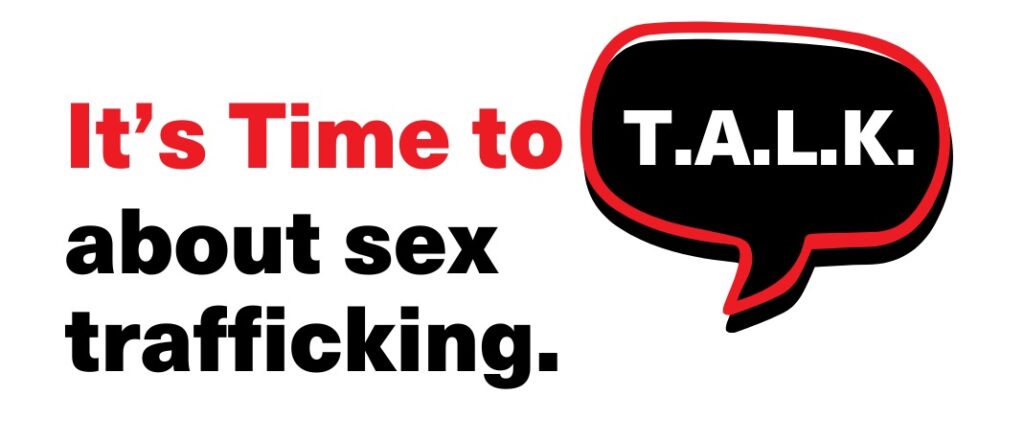Conversation is an effective way to combat this prevalent issue,
but Canadians desperately need and want resources
Toronto, Ontario – February 20, 2024 – Sex trafficking is a Canadian issue and our nation knows it. New research* reveals that 74 per cent of Canadians believe that sex trafficking is prevalent in Canada. Despite this fact, more than 70 per cent admit they have never had a conversation with a friend or family member about protecting themselves against sex trafficking. In fact, only 15 per cent of Canadians feel confident in their knowledge about the issue to start a conversation. Traffickers exploit this lack of education and awareness to target unsuspecting youth and ensure their crimes go unnoticed in our communities.
To mark National Human Trafficking Awareness Day on February 22, The Canadian Centre to End Human Trafficking (The Centre) is sharing information to help all Canadians “talk the T.A.L.K.” and facilitate crucial conversations around sex trafficking, especially with young people. The downloadable resource, created in consultation with survivors of sex trafficking, is called “It’s Time to T.A.L.K.” – which stands for Teach Yourself About the Issue; Approach the Conversation with Care; Listen and Adapt; and Know There is Help. It is available on the Canadian Human Trafficking Hotline’s website HERE.
The Centre created this resource to address the demand for information they have seen through operating the Canadian Human Trafficking Hotline (the Hotline). Most calls to the Hotline are related to sex trafficking, and concerned family and friends seeking information make up the second largest group of callers. This need for resources is further supported by the research findings:
- 97 per cent of those surveyed feel that Canadians have a duty to help youth protect themselves against sex trafficking
- 95 per cent of Canadians feel we need more tools to better understand sex trafficking in Canada
- 85 per cent of those surveyed would like to help end sex trafficking in Canada but don’t know where to start
- 68 per cent of Canadians are open to having a conversation with a young person about sex trafficking, but either need to understand the subject better or feel it’s difficult to find the right words
“Sex trafficking is a complex and serious social issue that is not going away on its own,” says Julia Drydyk, Executive Director, The Centre. “We understand the topic may seem overwhelming, but the reality is that we all need to start talking about it if we ever hope to end sex trafficking in Canada. That’s where we believe this resource can make a tangible difference.”
| The Canadian Centre to End Human Trafficking operates The Canadian Human Trafficking Hotline, a confidential, multi-lingual service available 24/7. If you suspect that you or someone you know may be being exploited, if you want to access support, or if you want to learn more, call 1-833-900-1010 or reach out via chat at www.canadianhumantraffickinghotline.ca. |
Talking the T.A.L.K.
“It’s Time to T.A.L.K.” addresses some of the most pressing information gaps that survey respondents identified, including:
- Understanding how traffickers exploit vulnerabilities to groom victims
- More education around what a healthy relationship looks like
- Empowering young people to set boundaries and understand consent
The research also revealed key barriers to having a conversation about sex trafficking including: lack of information and limited understanding of the issue; and not being comfortable talking about sex, trafficking and/or consent.
To address these concerns, “It’s Time to T.A.L.K” provides four crucial steps in initiating conversation:
T – Teach Yourself About Sex Trafficking: There are many misperceptions around sex trafficking and it’s important to learn the realities. Sex trafficking can affect anyone. It rarely involves being abducted by a stranger. Instead, it is most often calculated and staged luring, grooming, manipulation, coercion, and exploitation by someone known and trusted by the person being exploited.
A – Approach the Conversation with Care: It is essential to create a judgment-free space void of distractions for your discussion. While there is no “script,” The Centre provides some conversation starters around key issues such as consent; healthy relationships; self-worth; and setting boundaries; as well as some general conversation dos and don’ts.
L – Listen and Adapt: Be an active listener. You may not have all the answers, but that’s okay; discover the information together. If someone is unwilling to talk to you, ensure they are talking to someone whether that is another adult, trusted friend, etc. And keep the door open for future communication. The Centre also provides practical tips should you discover someone you know is already being trafficked, starting with telling them that you believe them.
K – Know There is Help Available – The Canadian Human Trafficking Hotline operates 24 hours a day, 365 days a year. It is a national service providing support for those who may be being exploited or those who simply want to learn more. Independent of police or government, it operates in more than 200 languages, and partners with more than one thousand service providers across Canada to provide local assistance.

Download the complete “It’s Time to T.A.L.K.” document here.
“Friends and family play a crucial role in preventing sex trafficking and supporting those who are being exploited,” adds Ms. Drydyk. “While it may seem like a basic concept, open and frequent conversations can reinforce what constitutes a healthy relationship and may identify red flags before a dangerous situation escalates. Don’t be daunted; these conversations are essentially about letting people in your life know that you love them unconditionally and that you are always there to help.”
About The Canadian Centre to End Human Trafficking
The Canadian Centre to End Human Trafficking is a national charity dedicated to ending all types of human trafficking in Canada. In 2019, the organization launched the Canadian Human Trafficking Hotline, a 24/7, multi-lingual service that can be accessed via phone, chat, webform, and email. The Centre also operates as the national “backbone” organization working on this issue, working with governments, companies and service providers to facilitate collaboration, identify best practices, and advance change towards ending trafficking in our country. For more information on The Centre, please visit www.canadiancentretoendhumantrafficking.ca.
-30-
For more information, or to speak with a representative from The Canadian Centre to End Human Trafficking, please contact:
Danee Wilson, Strategic Objectives,
Tel: (437) 917-9445; Email: dwilson@strategicobjectives.com
Aziz Froutan, Communications Manager, The Canadian Centre to End Human Trafficking,
Tel: 647-714-2527; Email: afroutan@ccteht.ca
* Survey Methodology: Survey conducted from January 17 – 19, 2024 among a representative sample of 1,505 online Canadians who are members of the Angus Reid Forum. The survey was conducted in English and French. Margin of error: +/- 2.5 percentage points, 19 times out of 20.
